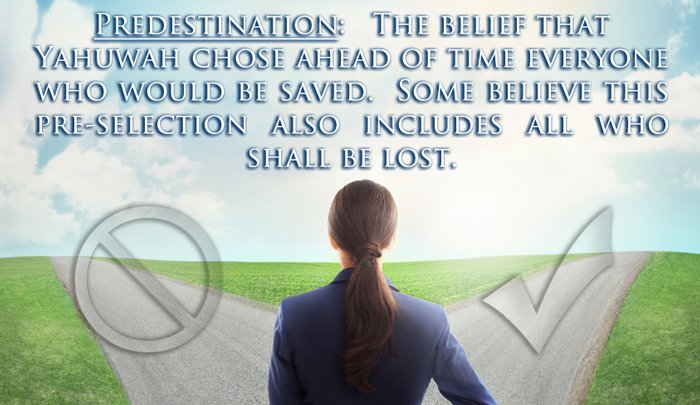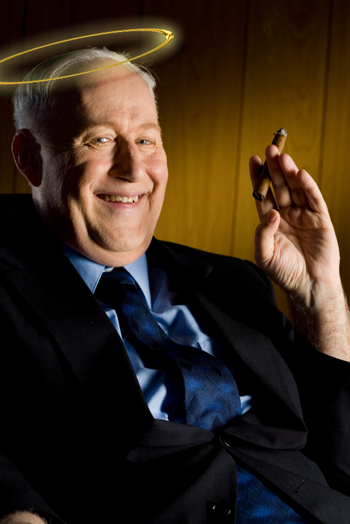

Most Christians are instructed from childhood that gambling is wrong. Parents and Sunday school teachers teach that Heaven has bestowed precious gifts on mankind and it is a divine duty and obligation to be wise stewards. Therefore, the risking or wasting of these gifts by gambling with them is a sin. And yet, millions of Christians believe and teach that salvation itself is a kind of lottery.
The doctrine of predestination, first introduced by the Protestant reformer John Calvin in the sixteenth century, reduces the good news of salvation to being nothing more than a cosmic roll of the dice, a divine game of chance. If God picked you to be one of the elect, lucky you! But if not, too bad; so sad. You lost. And nothing you can do will change your fate.
While those who believe in predestination are undoubtedly sincere in their belief, this doctrine is dangerous because it misrepresents and distorts the loving character of Yahuwah. This article will discuss the various components of the doctrine of predestination and explain how these beliefs contradict the revealed word of Yahuwah thus, misrepresenting the character of Yahuwah as revealed in Scripture.
Predestination is founded upon five foundational pillars. These five beliefs are:
At first glance, most if not all Christians would agree with at least some of these points. However, when compared carefully with Scripture, statements that appear reasonable and even consistent with the Bible are found, in fact, to contradict it. Let us take a look again at each of these five points, comparing each with the clear Word of Yahuwah.

It is true that everyone ever born has inherited a fallen nature from Adam. “There is none righteous, no, not one . . . for all have sinned and fall short of the glory of Yahuwah.” (Romans 3:10 and 23.) Lest any doubt the degree to which sin has lowered the human race, Isaiah declares: “We are all as an unclean thing, and all our righteousnesses are as filthy rags.” (Isaiah 64:6)
However, as used to support predestination, the error is one of extremity. If man were completely and utterly evil, he could not possibly obey the often-repeated call to repent and turn from evil:
“As I live, saith Yahuwah Eloah, I have no pleasure in the death of the wicked; but that the wicked turn from his way and live: turn ye, turn ye from your evil ways; for why will ye die, O house of Israel?” (Ezekiel 33:11)
Furthermore, if man were totally incapable of good, he could not be held accountable for his sins. To do so would be cruel and unjust.
While this sounds Biblical because mankind inarguably has inherited a fallen nature, it is still incorrect. To base one’s salvation entirely upon the off-chance that Yahuwah predestined him to be saved removes the exercise of free will from the equation. Predestination teaches that Yahuwah decides ahead of time who will be saved. Traditional Calvinists teach a “double predestination” where they believe that Yahuwah also predestines some souls to be lost.
The problems with such a belief are twofold:
First, it destroys personal accountability. Cain’s murder of Abel could be excused away by claiming Cain had been “predestined” to be lost, therefore he was “predestined” to murder his brother. It exempts a person from the consequences of their wrong actions. It removes personal responsibility for how others are affected by another’s wrong doings. In fact, that is precisely what Cain tried to do.
Scripture records the conversation between Yahuwah and Cain after the murder:
And it came to pass, when they were in the field, that Cain rose up against Abel his brother, and slew him.
And Yahuwah said unto Cain, Where is Abel thy brother? And he said, I know not: Am I my brother's keeper? (Genesis 4:8-9)
The error of this belief is quickly seen when Yahuwah rejects Cain’s excuses, declaring:
What hast thou done? the voice of thy brother's blood crieth unto me from the ground.
And now art thou cursed from the earth, which hath opened her mouth to receive thy brother's blood from thy hand;
When thou tillest the ground, it shall not henceforth yield unto thee her strength; a fugitive and a vagabond shalt thou be in the earth. (Genesis 4:10-12)
The second problem with Unconditional Election is that it implies Yahuwah predestined sin. Not all Calvinists take predestination quite this far, but some do, and that is a problem. If Yahuwah predestined everything, He also predestined sin when He chose certain souls to be lost. This contradicts Scripture which clearly states: “Let no man say when he is tempted, I am tempted of Yahuwah: for Yahuwah cannot be tempted with evil, neither tempteth he any man.” (James 1:13)
 Limited Atonement
Limited AtonementSuch selective redemption, while consistent with predestination, is not consistent with Scripture, which repeatedly asserts that Yahushua died for everyone. In Isaiah’s sublime prophecy of the work of the Messiah, he wrote:
All we like sheep have gone astray; we have turned every one to his own way; and Yahuwah hath laid on Him the iniquity of us all.
He shall see of the travail of His soul, and shall be satisfied: by His knowledge shall my righteous servant justify many; for He shall bear their iniquities.
Therefore will I divide Him a portion with the great, and He shall divide the spoil with the strong; because He hath poured out His soul unto death: and He was numbered with the transgressors; and He bare the sin of many, and made intercession for the transgressors. (Isaiah 53:6, 11-12)
One of the most beautiful and widely quoted passages of Scripture further underscores this by declaring that Yahushua died for the entire world, not a preselected, lucky few.
For Yahuwah so loved the world, that He gave His only begotten Son, that whosoever believeth in Him should not perish, but have everlasting life.
For Yahuwah sent not His Son into the world to condemn the world; but that the world through Him might be saved. (John 3:16-17)
 Irresistible Grace
Irresistible GraceThis belief rejects the very foundation on which the plan of salvation rests! Stated another way, this belief teaches that no one has freedom of choice. Every son and daughter of Adam inherited a sinful nature. Yahuwah, “not willing that any should perish, but that all should come to repentance” (2 Peter 3:9) sacrificed His Son to allow everyone a second chance to choose for themselves. If this choice is removed by some divine decision choosing some to be saved and rejecting others to be lost, the very reason for Yahushua’s death is set aside.
This belief states that no one, no matter how stubbornly rebellious or desirous of clinging to a favorite, cherished sin, can be lost if Yahuwah has decided otherwise. Contrarily, no one, regardless of how he may long to be like Yahuwah, will be saved if he has been preselected to be lost. This destructive belief is not supported by the clear statements of Scripture which places the decision solely on the individual. “Multitudes, multitudes in the valley of decision: for the day of Yahuwah is near in the valley of decision.” (Joel 3:14)
 As with the doctrine of “irresistible grace,” the belief that once a person has been saved, there is nothing he can do to be lost, once again enslaves the human will. No one is a “free moral agent.” A person’s freedom of choice is not removed just as soon as he accepts the gift of salvation. The apostle Paul himself referred to the possibility of being lost – even after all he had done to bring salvation to others!
As with the doctrine of “irresistible grace,” the belief that once a person has been saved, there is nothing he can do to be lost, once again enslaves the human will. No one is a “free moral agent.” A person’s freedom of choice is not removed just as soon as he accepts the gift of salvation. The apostle Paul himself referred to the possibility of being lost – even after all he had done to bring salvation to others!
“I keep under my body, and bring it into subjection: lest that by any means, when I have preached to others, I myself should be a castaway.” (1 Corinthians 9:27)
The doctrine of predestination contradicts other principles found in Scripture. Among the last words spoken by the Saviour that are recorded in Scripture is the command: “Go ye therefore, and teach all nations, baptizing them . . . . Teaching them to observe all things whatsoever I have commanded you: and, lo, I am with you always, even unto the end of the world.” (Matthew 28:19-20) If Yahuwah had already determined the person would be saved, evangelization would serve no purpose since they would be saved anyway.
Furthermore, if Yahuwah has already predestined some to be saved, it is pointless to pray for family and friends as they will be saved or lost depending upon Yahuwah’s selection and nothing anyone can do can change His mind. Such a belief is a denial of the Biblical principles of praying for others so aptly summarized by the Prophet Samuel. When Israel insisted on having a king to reign over them, they effectually rejected Yahuwah as their sovereign. At that time, with a breaking heart, Samuel said words which resound to this day:
Moreover as for me, Eloah forbid that I should sin against Yahuwah in ceasing to pray for you: but I will teach you the good and the right way:
Only fear Yahuwah, and serve Him in truth with all your heart: for consider how great things He hath done for you.
But if ye shall still do wickedly, ye shall be consumed, both ye and your king. (1 Samuel 12:23-25)
Nothing here is predetermined. Samuel is setting forth the consequences if they continued to rebel against their Maker. Shortly before the death of Moses, he gave a clarion call to all Israel to exercise their Yah-given freedom of choice and choose righteousness:
I call heaven and earth to record this day against you, that I have set before you life and death, blessing and cursing: therefore choose life, that both thou and thy seed may live:
That thou mayest love Yahuwah thy Eloah, and that thou mayest obey His voice, and that thou mayest cleave unto Him: for He is thy life, and the length of thy days. (Deuteronomy 30:19-20)
Moses, friend of the Most High, humble servant with whom Yahuwah would speak “face to face, as a man speaks with his friend,” (Exodus 33:11) flatly rejected any hint of predestination, clearly stating that it was the choice of the individual.
Worse than anything else, though, is what predestination says about the character of Yahuwah. Predestination is unjust because the un-elect are predestined to be lost through no fault of their own! It is certainly true that the heart of a fallen human being is corrupted with sin. “The heart is deceitful above all things, and desperately wicked: who can know it?” (Jeremiah 17:9) It is also true that salvation is the free gift of Yahuwah: “For by grace are ye saved through faith; and that not of yourselves: it is the gift of Yahuwah.” (Ephesians 2:8) The error enters when human choice is removed.
Scripture declares that “Yahuwah is love.” (1 John 4:8) An Eloah of love would not remove freedom of choice from His precious children, playing some kind of divine lottery, selecting some to be saved, but even more to be lost.
Nor is such an act just. The Bible reveals the character of the Creator:
Thus saith Yahuwah, Let not the wise man glory in his wisdom, neither let the mighty man glory in his might, let not the rich man glory in his riches:
But let him that glorieth glory in this, that he understandeth and knoweth me, that I am Yahuwah which exercise lovingkindness, judgment, and righteousness, in the earth: for in these things I delight, saith Yahuwah. (Jeremiah 9:23-24)
The doctrine of predestination is a very destructive belief. It presents the loving Creator as cruel, heartless and arbitrary. This contradicts Scripture, which presents Him as a loving Father who is unwilling that any should perish. The result is that human hearts are repelled by such cold injustice. They turn away, not understanding that these character attributes do not belong to Yahuwah, but have been falsely attributed to Him by the enemy of Yah and man, Satan.
False beliefs about the character of the Redeemer come between the soul and his Creator. Yahuwah calls on all to lay aside every belief not founded upon Scripture. Accept the love He has for you. You will see depths of beauty in the divine character that will draw you to Him with bonds of infinite love. He does not sit remote and apart from His creation, arbitrarily choosing some to be saved and everyone else to be lost. Instead, He is actively involved in drawing everyone to Himself as He longs for all to be saved.

“Yahuwah hath appeared of old unto me, saying, Yea, I have loved thee with an everlasting love: therefore with lovingkindness have I drawn thee.” (Jeremiah 31:3)